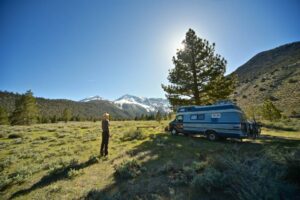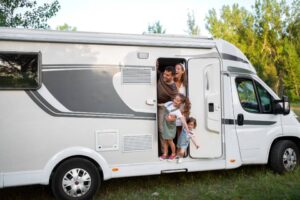I remember the first time I pulled into a remote spot in Arizona, tucked away in the desert, my RV parked next to a rugged mountain range. The sun was setting, painting the sky in shades of pink and orange, and I thought, “This is the life.”
No neighbors in sight, no traffic—just me, my RV, and the open road. It got me thinking: What if I could live in my RV all the time? I mean, how amazing would it be to make every spot like this home?
Well, it turns out that living in an RV on your own property is possible in many places—but not everywhere. Some states make it easier, while others put up more roadblocks.
So, if you’re dreaming of RV life but want to park it on your own land, here’s everything you need to know about what states allow you to live in an RV on your property.
Why Would You Want to Live in an RV on Your Property?
Before we start exploring the states, let’s chat about why someone might want to do this in the first place.
For many of us, RV living means freedom. It’s about ditching the mortgage, avoiding rent, and taking the “home” part of life into your own hands. If you’re looking for the best value-for-money RV, we have you covered.
Imagine having a scenic view right out your window every day. Or not worrying about the cost of utilities because you’re self-sufficient.
Some folks are looking to downsize, while others are just trying to make their homes more affordable or flexible. Whatever your reason, it’s a growing trend—and a very personal decision!
What States Allow You To Live In An Rv On Your Property?

If you’re considering making the leap, some states are more lenient than others about letting you live in an RV on your property.
But even in these states, you’ll still need to pay attention to local laws, as counties and cities can throw their own curveballs into the mix.
1. Florida: Sunshine and RVs
Florida has become a go-to state for RV lovers, and not just for the warmth. It’s relatively easy to set up full-time RV living on your own property here.
You’ll just need to ensure that your RV is connected to utilities like water, electricity, and sewage, and that it meets local building codes.
One thing to keep in mind: you can only have one RV on the property at a time, and it needs to be parked behind or beside the house (no RVs in front yards, please).
Florida’s relaxed approach makes it a great option for full-time RV living.
2. Texas: The Land of the Free… RV Life
Texas is another RV-friendly state with no statewide laws banning RV living. It’s a popular choice for RVers because of the wide open spaces and minimal restrictions.
But hold up—while Texas may not impose any statewide rules, you still need to check with local municipalities.
Different cities or counties can have zoning laws that regulate where you can park your RV or how long you can stay.
So, while you can live in an RV here, make sure to get the green light from the local authorities before you move in for the long haul.
3. Oregon: West Coast Vibes and RV Permits
Oregon has some cool new laws that make it easier for homeowners to keep an RV on their property.
In fact, as of 2024, Oregon passed a law allowing homeowners to park an occupied RV on their land as long as they follow local laws and address any potential nuisances.
Oregon is great for nature lovers and anyone who wants to live in an RV surrounded by forests, mountains, and rivers.
However, keep in mind that you’ll still need to ensure proper sanitation and water supply—because no one wants to live next to a bad sewer system!
What is the Cheapest State to Live in an RV?

While some states are more lenient when it comes to RV living, others offer a cheaper cost of living that makes the dream of RV life even more attainable.
The cost of living varies greatly depending on the region, and when it comes to RV living, you’ll want to find a state where you can stretch your dollar further.
South Dakota: One of the most affordable states for RV living is South Dakota. It’s got relatively low property taxes, no state income tax, and lower-than-average costs for utilities and services.
Plus, you’ve got plenty of rural areas where living in an RV is not only permitted but encouraged! Arizona and Texas are also great affordable options, especially if you plan to park in more rural or less populated areas.
With mild winters and low cost of living, these states make living in an RV an attractive proposition for budget-conscious travelers.
What is the Best State to Own an RV?
When it comes to owning an RV, some states are more RV-friendly than others, offering things like great campgrounds, scenic routes, and even tax benefits for RV owners.
South Dakota: South Dakota takes the crown here as well, largely due to its no-state-income-tax policy and an abundance of beautiful areas to explore. It’s a popular state for RV owners who want to enjoy both the lifestyle and the tax perks.
California and Florida: Other top states to own an RV include Florida, with its extensive RV parks and sunny weather, and California, despite its tougher restrictions on full-time living, for its scenic routes and campgrounds.
Which States Are a Little More… Complicated?
While some states make RV living a breeze, others have stricter regulations that you’ll need to navigate before moving in. Here are a few to watch out for:
4. California: Not Your Full-Time RV Home
Unfortunately, California isn’t one of the more RV-friendly states when it comes to full-time living.
While it’s totally fine to park your RV for short stays—maybe for a weekend getaway or during home renovations—living in one full-time is generally not allowed.
Local ordinances may vary, but most areas are pretty strict about long-term RV residency.
Temporary stays might be allowed as long as your RV doesn’t create any health or safety hazards, but you won’t find many long-term RV parks where you can permanently park your rig.
5. Georgia: City vs. Country
Georgia is another state where the rules can change depending on where you are. Many urban areas in Georgia—especially around cities—don’t allow full-time RV living due to zoning and safety concerns.
However, rural areas are generally more flexible. You may be able to live in an RV if you’re in a less populated area and if you comply with local regulations.
It’s all about location, location, location, so always check with local authorities before making any permanent plans.
6. New York and New Jersey: Get Permission, Please
Both New York and New Jersey allow RV living, but you’ll need to jump through a few hoops.
Generally, you’ll need to get permission from the local municipality or city to live in an RV on your private property.
These states have their own set of zoning laws, and local governments often require permits to ensure safety and sanitation.
So, while it’s not impossible, it’s definitely more paperwork and planning than in states like Texas or Florida.
Key Considerations Before You Park Your RV

Okay, so you’ve found your perfect state—now what? Here are some important factors to keep in mind as you prepare to live in your RV on your property.
Zoning and Local Ordinances
You may be able to live in an RV on your property, but local zoning laws can make a big difference.
Cities and counties have the power to restrict where RVs can be parked, how long they can stay, and whether or not they’re connected to utilities.
So, even in states that allow RV living, always check with your local authorities to avoid fines or violations.
HOA Rules
If your property is part of a homeowner’s association (HOA), you’re going to have a few more restrictions to deal with.
HOAs often have strict rules about RVs, including where you can park them (hint: they probably don’t want an RV in your driveway).
You’ll want to make sure your HOA allows RVs and doesn’t restrict your ability to live in one on your property.
Utilities and Sanitation
A big part of RV living is ensuring that your RV is connected to essential utilities like water, electricity, and sewage.
In many places, RVs are subject to building codes, which means you’ll need to meet sanitation and waste disposal standards.
Make sure your setup includes proper systems for water and waste to keep everything clean and compliant with local laws.
Duration and Purpose
Some areas allow RV living for temporary purposes, like during home renovations or as a guest house, but restrict long-term or permanent stays.
Be sure to understand whether your intended stay is temporary or full-time—and whether that’s acceptable where you live.
FAQ Section: Real RV Questions Answered
Q1: Can I live in an RV on my property in Florida year-round?
Yes, you can live in an RV on your property in Florida as long as it’s connected to utilities and meets building codes. Just make sure your RV is parked behind or to the side of your house, not in the front yard.
Q2: Are there any special permits needed to live in an RV in Texas?
In Texas, there are no statewide laws preventing RV living, but local regulations can vary. Some areas may require a permit, especially if you plan to stay long-term, so always check with your city or county before making your move.
Q3: Can I park my RV in California for a long stay?
In California, you can park your RV temporarily, but full-time RV living is generally not allowed. Temporary stays for up to a few weeks may be fine, especially during home renovations or for short visits, but long-term residency is typically not permitted.
Q4: Can I live in an RV in New York or New Jersey?
Yes, you can live in an RV in New York or New Jersey, but you’ll need to get approval from your local municipality or city. Be sure to check zoning laws and obtain any necessary permits before moving in.
And That’s a Wrap! Time to Hit the Road
So, where can you live in an RV on your property? It really depends on where you are—and a lot of that depends on local rules.
States like Florida, Texas, and Oregon are more flexible, but others, like California, have tighter restrictions.
No matter where you end up, just be sure to do your research, check your local ordinances, and ensure your RV is set up safely and legally.
And remember, every great road trip starts with a little planning—so take the time to prepare for the life of freedom and adventure that comes with living in an RV!
Happy travels!

